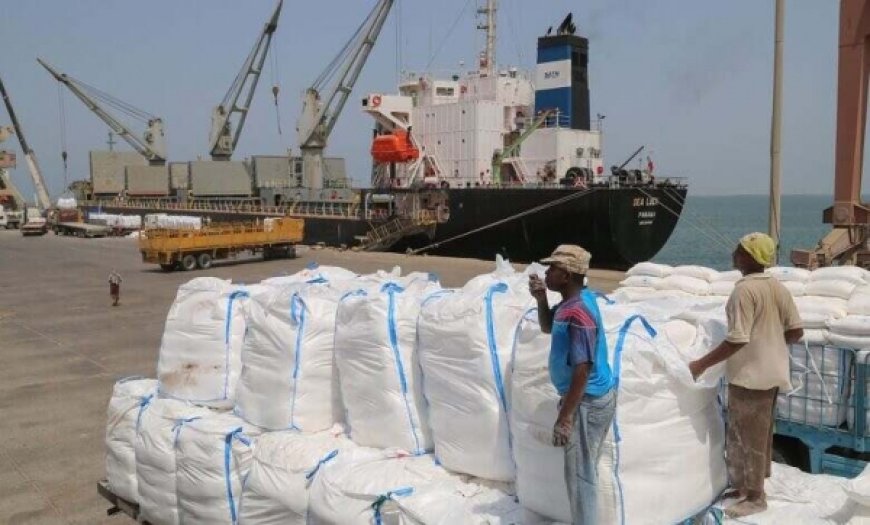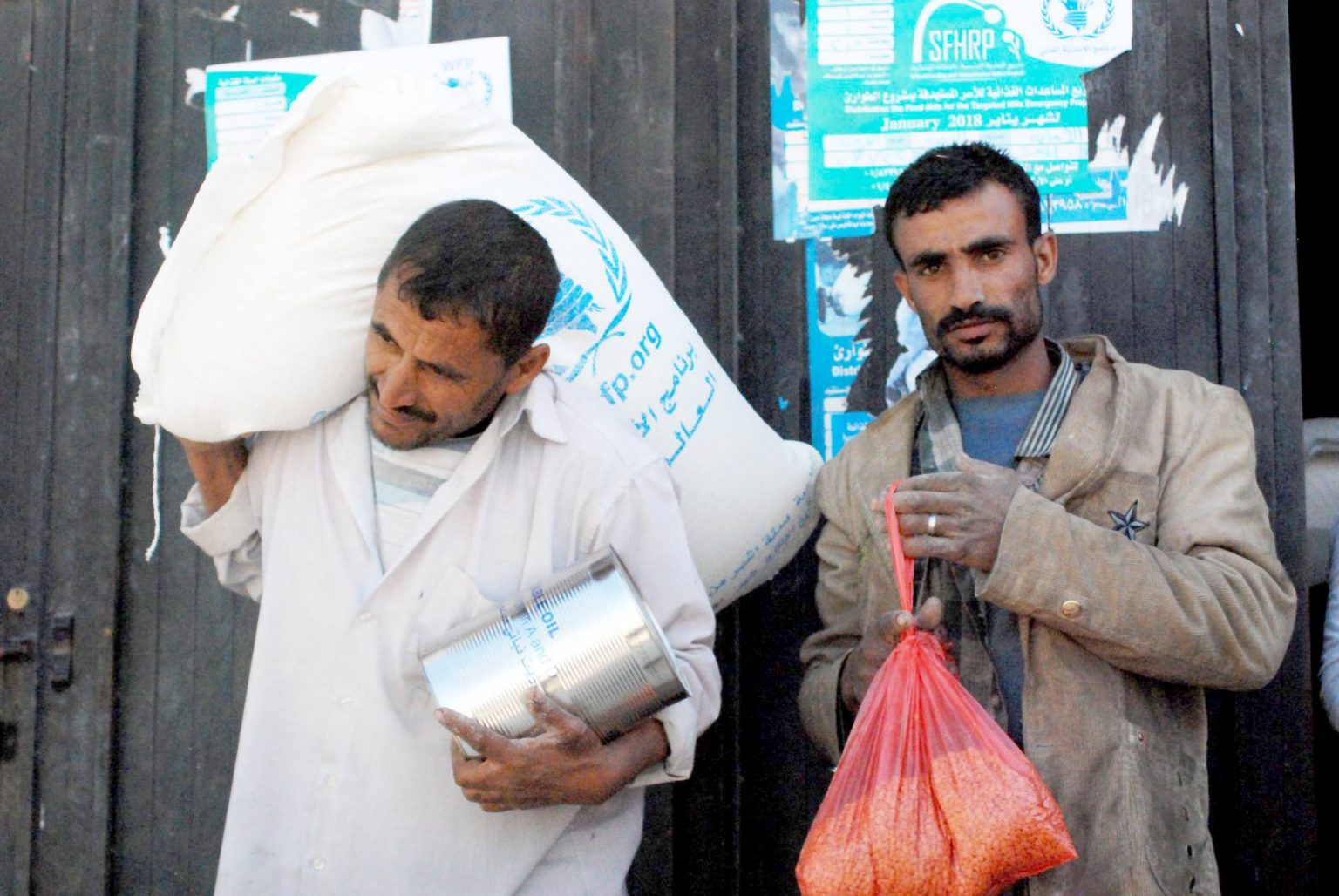
Yemen Monitor/Reporting Unit/Special Report:
In a controversial move, the Houthi group announced on January 8th a decision to ban the import of flour through the ports of Hodeidah and Ras Isa, which are under their control in western Yemen.
The decision, justified by the group’s Ministry of Industry and Trade in Sana’a as an attempt to localize domestic industries, has sparked widespread controversy amid warnings of an exacerbation of the economic and humanitarian crisis in the country, threatening food security just two months before the holy month of Ramadan, which is the peak of demand and consumption, thereby increasing the risks of inflation.
Media sources reported that the Houthis have threatened traders with imprisonment, fines, and license revocation if they violate these directives.
Hodeidah Port is the main port in Houthi-controlled areas, supplying these areas with food, supplies, and petroleum products. These areas are home to more than 75% of the population, and Yemen relies on imports for more than 90% of its food and supply needs, which indicates a looming humanitarian catastrophe that could further exacerbate the humanitarian crisis, according to previous UN reports.
Monopoly and Black Markets: How the Houthis’ Ban on Wheat Flour is Affecting Yemenis?
A 50-kilogram bag of flour now costs 14,200 Yemeni riyals, equivalent to $26, in Houthi-controlled areas. The decision is expected to lead to a surge in flour prices and exacerbate black market activities, further complicating the humanitarian crisis amid a halt in aid.
Economist Abdulwahed Al-Aubali told Yemen Monitor that the Houthi group’s decision to ban flour imports is a clear attempt to monopolize this essential commodity by restricting independent traders and allowing only the group’s traders to control the market. This step reflects their exploitation of trade outlets to achieve economic and political gains at the expense of the suffering of the Yemeni people, amidst the worst humanitarian crisis in the world.
Al-Aubali continues: “Practically speaking, Yemen heavily relies on wheat imports to meet its basic food needs, as domestic production is insufficient to meet the growing consumption of the population. Preventing ordinary traders from importing flour means opening the door for Houthi traders to monopolize the market, leading to a significant increase in prices and reducing the purchasing power of citizens, especially in light of the deteriorating economic situation and high poverty rates.”
This measure deepens the food crisis and threatens food security in Yemen, according to Al-Aubali. Millions of Yemenis are now at risk of further hunger and malnutrition. Moreover, this step demonstrates the Houthis’ use of state resources and trade outlets as a tool for domination and control, regardless of the exacerbation of the people’s suffering.
He emphasized that the continuation of these policies requires urgent international intervention to pressure for an end to this monopoly and ensure that imports remain open to all traders without restrictions or exploitation.

High Imports and Localization Efforts
Economic analyst Rashid Al-Hadad affirmed that the recent decision to reduce flour imports and announce the localization of wheat production has sparked widespread debate in Yemen. He explained that the decision was striking, especially since Yemen heavily relies on foreign imports, importing about 90% of its wheat needs, equivalent to 3.3 million tons annually.
While Al-Hadad agreed with the justification provided by the Houthi Ministry of Industry, he pointed out in an interview with Yemen Monitor that efforts to achieve self-sufficiency are still in their early stages. Although there have been some steps in this direction, they are slow and limited and have not yet reached the stage of meeting the needs.
The economic analyst, who is familiar with the Houthi thinking, said that talk of reaching self-sufficiency in grains is still far off, but he noted that “the country has witnessed fierce competition between local and imported mills in recent years. This competition has prompted the leadership to issue a decision to ban the import of flour from abroad and rely on local production, in a step aimed at encouraging the private sector to increase the production of grain crops.”
He explained that the country had been importing large quantities of flour in recent years, which negatively affected the performance and productivity of local mills and led to the closure of many of them, causing significant losses to the national economy.
High External Imports
According to a study by the Houthi-controlled Ministry of Industry and Commerce in Sana’a, Yemen’s annual wheat and flour import bill is estimated at around $700 million. Additionally, Yemen imports most of its wheat from Australia, the Americas, and Russia, relying on imports to meet over 95% of its wheat consumption needs.
Yemen currently produces about 150,000 tons of wheat annually, while the food gap in the crop stands at 94%.
According to UN estimates, up to 18 million people (more than 50% of the total population) are expected to face food insecurity by February 2025.
Furthermore, grain production declined in 2024 to slightly below the average level, primarily due to dry weather conditions during planting in the main crop-producing governorates of Hodeidah, Hajjah, and Dhamar, and limited access to inputs due to high costs.

A Tool of Pressure and Starvation
While the Houthis argue that the ban on flour imports is aimed at “reducing the import bill and limiting the flooding of markets with competing foreign products, as well as protecting domestic products,” Abdul Latif al-Fujair, Undersecretary of the Ministry of Local Administration for Financial and Administrative Affairs, describes the Houthi group’s continued imposition of strict measures on flour imports through Hodeidah port, despite knowing that domestic production cannot meet the needs of the Yemeni market, as a tool of pressure and starvation.
In a conversation with Yemen Monitor, al-Fujair, who serves as an undersecretary for the internationally recognized government, pointed out that this decision threatens to increase the suffering of citizens amid the deteriorating economic conditions, which could lead to a severe food crisis in the country.
“It seems that the Houthi group is adopting a policy of starvation as a tool to pressure the Yemeni people, aiming to weaken their rights demands and keep them preoccupied with securing their daily bread instead of demanding their right to a decent life. This is what these militias fear, which continue to escalate crises to control the internal situation,” al-Fujair said.
He continued, “Today, the Houthi group realizes that the Yemeni people have become a ticking time bomb, waiting for the right moment to explode in the face of these unjust forces that have been taking revenge on them for years. Despite their continued attempts to escalate various crises, such as the oil, gas, and salary crisis, they overlook the fact that the Yemeni people, who have patiently endured their tyranny for a long time, will not hesitate to respond at the appropriate time.”
The Houthis say that the program to localize products is ongoing for “a number of goods and food items.”
With the ongoing dispute over the decision to ban flour imports, the question remains: Can Yemen achieve self-sufficiency in wheat and flour amid its worsening economic crisis? Or will the decision lead to more hunger and suffering in one of the world’s worst humanitarian crises?
UN Warnings
The Food and Agriculture Organization of the United Nations (FAO) responded to this question by stating that the Houthis’ decision to ban the import of wheat flour “may benefit the labor market and the economy in the long term, but the sudden ban, without a sufficient transition period, coupled with the weak local capacity to mill wheat and the existence of a monopoly in this field, raises concerns.”
The FAO added that the Houthi decision “will lead to a decrease in imports, disruption of trade and supplies, and an increase in wheat flour prices in the short term. In addition, this decision encourages traders to import wheat flour through the port of Aden, which causes high transportation costs, fees to overcome obstacles, and double taxation by the Sana’a authorities, which will ultimately be passed on to consumers in the form of higher prices.”
With the rising price of flour, it is expected that the purchasing power of households in Houthi-controlled areas will remain very weak, leading to limited access to food during the holy month of Ramadan.




